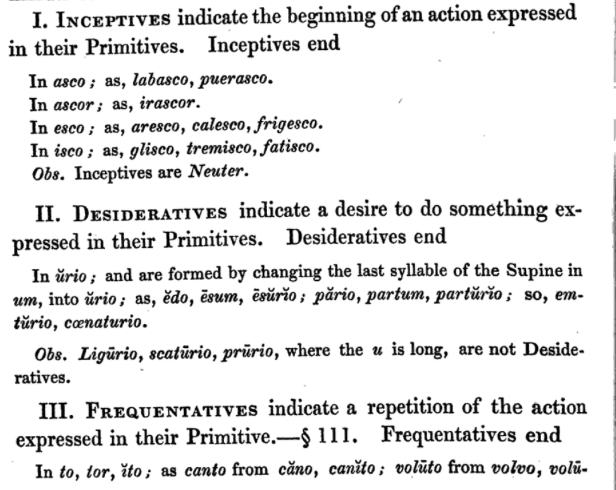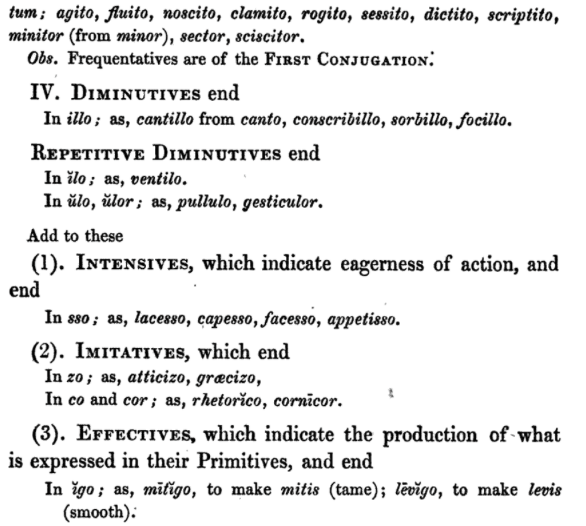Do we have any cases where the Romans intentionally conjugated a noun or adjective into a verb? This is common in English and other modern languages, so I'm assuming it is a natural concept. However, it seems that the Romans didn't often think of their grammar, as there do not appear to be native words for verb, noun, etc.
5 Answers
There are at least some cases in which this can be done, with different shades of meaning.
graecisso (-izo), āre, v. n., = Γραικίζω, to imitate the Greeks, to adopt a Grecian manner or tone: atque adeo hoc argumentum graecissat; tamen Non atticissat; verum sicelissat, Plaut. Men. prol. 7; v. Ritschl ad h. l.: graecizat, Consent. 1063 P.
atticisso, āre, v. n., = ἀττικίζω, to imitate the Athenian manner of speaking: hoc argumentum graecissat, tamen non atticissat, verum sicilicissitat, Plaut. Men. prol. 12; App. Flor. n. 18, p. 362, 12.
sicilisso or sicelisso, āre, v. n. Siculi, to imitate Sicilian manners: hoc argumentum graecissat: tamen Non atticissat, verum sicelissat, Plaut. Men. prol. 8; v. Ritschl ad h. l.
And then there are some in -or:
cornīcor, āri, v. dep. cornix, to caw like a crow (very rare): quid grave secum inepte, Pers. 5, 12; cf. Prisc. p. 828 P.; Hier. Ep. 125, n. 16.
rhētorico, āvi, 1 (ante-class.), and rhētoricor, āri, v. dep. (post-class.) [rhetoricus], to speak rhetorically or like an orator, Novat. ap. Non. 476, 6 (Com. Rel. p. 216 Rib.); act. form, Tert. Res. Carn. 5.
(Though I'll note that there's also rhētorisso, āre,.)
My understanding is that this tendency is more common in ancient Greek than in Latin, but that's just from something my first Greek teacher said ten thousand years ago, so it could be totally wrong.
In any case, it seems to be fairly rare; then again, it's fairly rare in English too—we might talk about somebody "Clinton-izing" something or "Coulter-izing" something (sorry, politics on the brain), but not very often.
EDIT: An explanation from a different angle from 1841's Linguæ Grammaticæ Rudimenta:
-
310K years ago would be really ancient Greek! Pre PIE, even :-)– andy256Commented Sep 19, 2016 at 23:05
-
1
-
"My understanding is that this tendency is more common in ancient Greek than in Latin, but that's just from something my first Greek teacher said (...)." --- I heard this too.– LucCommented Jan 20, 2017 at 9:58
A noun can be turned into a verb in Latin. But since both nouns and verbs have endings — quite incompatible ones one might add — an adjective cannot work as a verb as such. Instead, slight modifications are needed.
In other words, verbs can be derived from nouns. In English nouns and verbs can look alike, and the derivation need not do anything to the word, other than reinterpreting it as a verb.
Consider these derivations with minimal changes to the word, for example:
laus, thank > laudare, thank
vulnus, wound > vulnerare, wound
liber, free > liberare, free
finis, end > finire, end
-
1I can't just decide to make any verb a noun, can I? No "Grumio, Grumere, Grumivi, Grumitus" for me?– tox123Commented Sep 18, 2016 at 17:06
-
@tox123, do you mean making any noun a verb? Typically these derivations are first conjugation and regular. I see no problem with grumo, grumare, grumavi, grumatus, although you may need to explain what you mean by it if you use it. You can apply this to any noun I guess, although some of the new verbs will be more natural than others.– Joonas Ilmavirta ♦Commented Sep 18, 2016 at 17:10
-
3I believe tox123 is referring to the famous Grumio from the Cambridge Latin Course... Presumably "to behave in a Grumio-like fashion"? :)– jogloranCommented Sep 18, 2016 at 22:04
-
1@tox123, I misinterpreted your comment, not knowing Grumio before another comment corrected me. If it's third declension (Grumio, Grumionis), I'd be tempted to use the verb Grumionizari. I've seen this -izari suffix to mean acting like someone.– Joonas Ilmavirta ♦Commented Sep 19, 2016 at 9:24
-
1@tox123 All hail the glorious Grumio! In our Latin class, we have declared Grumio a god, and have this whole religion and communist manifesto for him. It's pretty great. See this question for a passage from His holy scripture.– Sam KCommented Sep 19, 2016 at 16:26
We can see how miles, -itis was adapted in milito, militare, and I seem to recall that corinthio, -are was "to work in Corinthian brass", so the short answer would be "yes".
I think that, with a bit of imagination, you could conduct a simple search to find or verify other examples.
There are certainly expressions for verb, recorded in some of the best writers, distinguishing verba agentia, verba neutra and verba patiendi. A proper noun is simply nomen propria, and so on.
-
-
1@tox123 It can't be verbam actionis because verbum is neuter, and would never have a -am ending.– Sam KCommented Sep 19, 2016 at 16:28
These are just denominative verbs and are quite common. From Allen & Greenough 258 (q.v.): "Verbs were formed in Latin from almost every from of noun-stem and adjective-stem."
purus adj 'pure' (more simply than other examples given) becomes puro (rare) ritually purify.
And vivus, lifegiving, becomes vivo, I live, So therefore:
butyro melleque vivo puro
can be (Gilgamesh) "I purify with life-giving butter and honey;" or (Winnie ille Pooh) "I live off pure butter and honey."
-
2L&S says puro might be a hapax legomenon: I think it's worth noting that purifico is a much more standard way of saying "purify"– brianpckCommented Sep 20, 2016 at 13:07
-
@brianpck Yet, there are a few noun /verb switches similar to English "I face book;" "You stackexchange;" "He googles." dominus (or indeed domina) dominat is another.– HughCommented Sep 20, 2016 at 14:31

